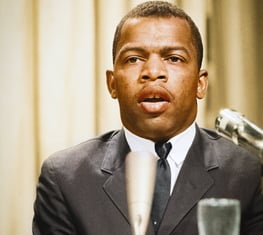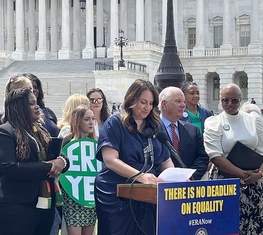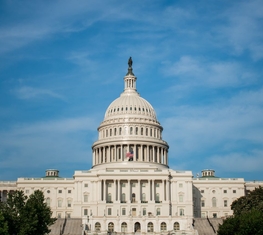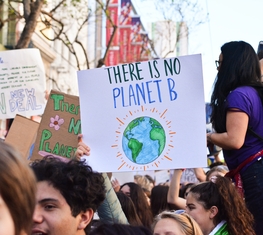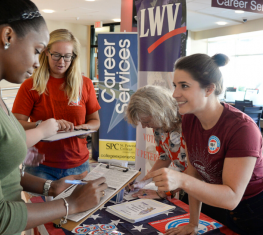A screenshot of the call-in tip from a Georgia voter. Note: Voters at Annistown Elementary believed that League volunteers had fixed the voting machines because they were talking with poll workers and helping to problem-solve. While League volunteers were there to provide assistance and observe, the poll workers were the ones who fixed the problems with the machines.
VIDEO: Stories from the Field - Georgia Election Protection
Every Election Day, League of Women Voters volunteers participate in election protection, the practice of observing polling places and talking with voters about any issues they experience, in order to ensure that voters are treated reasonably and fairly.
In 2018, we saw some of the biggest problems in Georgia, where voters waited for up to five hours to vote. Watch our video to hear some real stories from real voters on Election Day:
The League of Women Voters is a partner in the Election Protection Coalition—a group of organizations who provide information and assistance to voters through a variety of programs, including the 866-OUR-VOTE hotline. On Election Day, League staff work in the Election Protection headquarters in Washington, D.C., fielding tips and volunteers, advising on issues, and working up litigation when necessary. On the ground, League volunteers monitor polling places, talk to voters about any problems they experience, and report them to the Coalition.
As LWV Director of Advocacy and Litigation, Celina Stewart’s day began at 6:00 a.m. at the Election Protection headquarters. Within one hour of polls opening in Georgia, 866-OUR-VOTE received more than 70 calls reporting issues at two Georgia polling places in Gwinnett County. Stewart soon called LWV Georgia President Tracy Adkinson to dispatch a local League volunteer to observe and report what was happening on the ground.
“It was troubling to see that voters were met with obstacles in casting their vote from the onset,” Stewart said. “Overseeing Georgia, it was a priority to activate our state League immediately to assist at the polls.”
That’s when Adkinson called League volunteer Sharon Blackwood, who had expected she might be called to action that morning. Blackwood visited both Anderson-Livesy Elementary School and Annistown Elementary School to get a more complete picture of what was going on.
At Annistown Elementary, Blackwood interviewed several voters as they finished voting, having waited in line for up to five hours to do so.
“I was very impressed by how everyone was passionate about staying in line to vote. They were encouraging each other to stay and make their vote count,” she said. “The energy was high and their determination was fierce. It was inspiring.”
Equipped with the stories from these voters, Blackwood informed the Election Protection Coalition of the particular problems and resulting wait times at Annistown Elementary School. As she spoke with polling workers, the Election Protection hotline received a call explaining that the machines had been fixed and voting had begun.

Her report allowed the League to take action—with our Coalition partners, we sent a letter to the Georgia Secretary of State’s office urging him to extend voting hours at affected precincts. When no decision was made, the Coalition filed litigation asserting voter suppression at the polls that illegally prohibited voters from casting their ballots. As a result, extended voting hours were later granted at three affected locations, including Annistown Elementary.
“The League, as part of the Election Protection operation, was crucial to ensuring that voters were able to exercise their most fundamental rights on Election Day,” Stewart said. “The vigilance of voters reporting to the hotline, coupled with rapid response by the voting rights community, put voter suppression in check in a very important way.”
Sign Up For Email
Keep up with the League. Receive emails to your inbox!
Donate to support our work
to empower voters and defend democracy.
